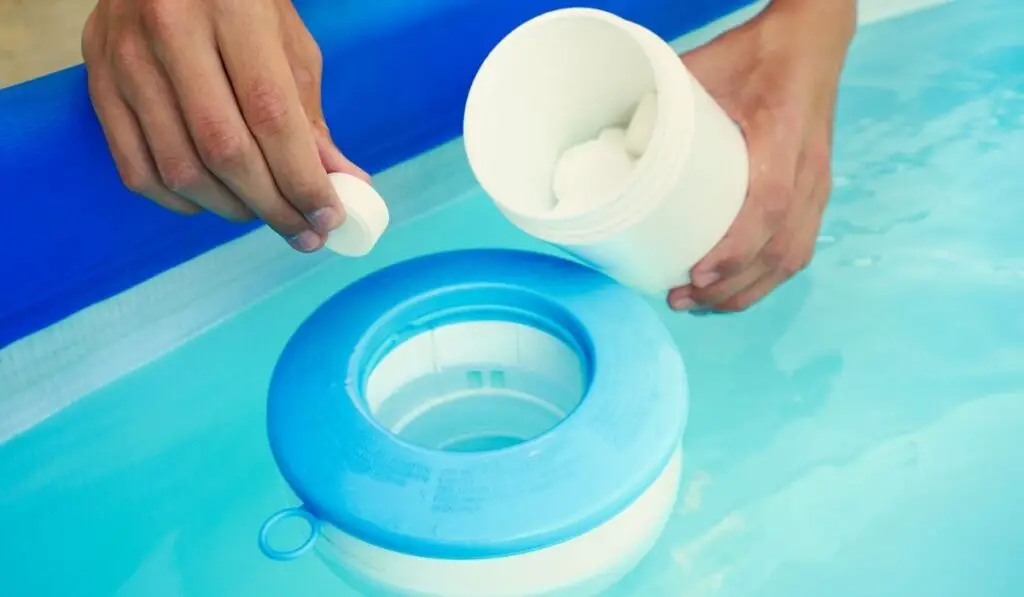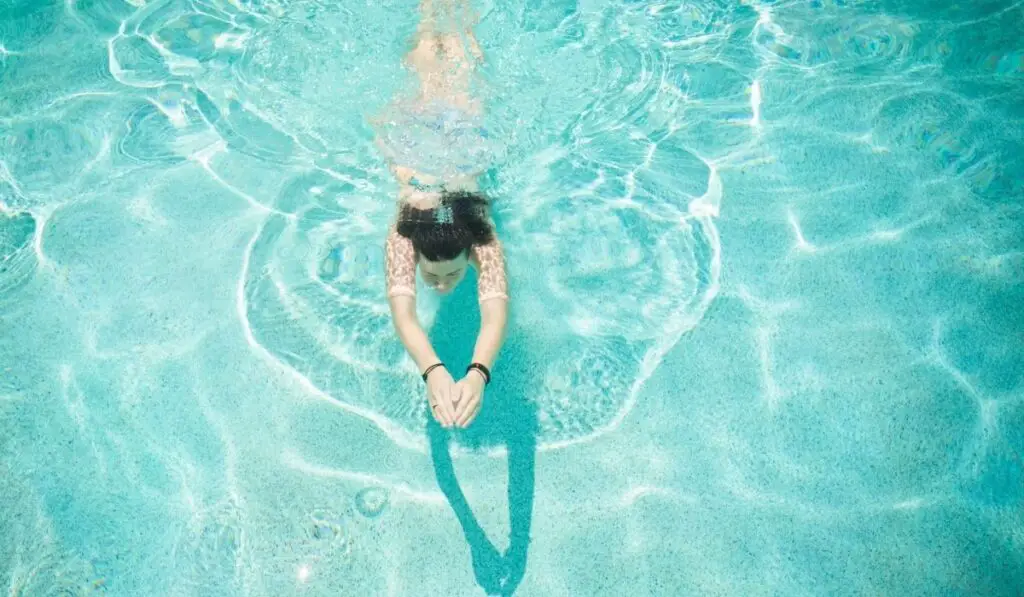If you have a saltwater pool, you may have wondered if you can add chlorine to it. After all, chlorine functions to kill germs and viruses in regular pools, so it would make sense if it served the same function in your saltwater pool. However, there are many things that can damage your saltwater pool — is chlorine one of them?
It’s safe to put chlorine in your saltwater pool. It may even be necessary to do so in some cases, to perform temporary shock. Saltwater pools generate their own small amounts of chlorine but often need a little assistance in producing enough to make the pool a safe environment to swim in.
However, before you go ahead and add chlorine to your saltwater pool, there are a few things you need to know and consider. Let’s take a look at everything you need to know about this combination.
Can You Put Chlorine in a Saltwater Pool?

Saltwater pools generate their own chlorine, so yes, it is completely safe to add this chemical to the pool. Many people don’t realize it, but your pool will sometimes even require you to supplement with chlorine to give the water enough power to get rid of all the bacteria. You can buy chlorine tablets (on Amazon) and safely add them.
Saltwater generators create their own chlorine in a saltwater pool, and it’s often fine to rely on this alone. However, sometimes you need to give your pool a little help.
What Kind of Chlorine Do You Use in a Saltwater Pool?
In your pool, the salt creates the chlorine. However, that’s sometimes not enough, so what else can you add?
Pure liquid chlorine is one of the best things to use, though you should make sure to only add enough to get your pool to the right level. There are also stabilizing chlorine tablets that can be helpful, but the chlorine is often stabilized too much to have a big effect on the bacteria. Granular chlorine also works well for regular use.
Some people will even use household bleach on their pool since it contains chlorine. This is technically okay to do, despite the fact it may sound blasphemous to some.
However, you will have to exercise extreme care when it comes to the levels of chlorine inside the bleach, as well as any other chemicals that it contains, as they might damage your pool. Never add bleach that has added fragrances and colors.
Regardless of what you’re using, you need to calculate your pool size and make sure you’re getting the measurements right. You can do this by multiplying the length and width of the pool with the average depth, which will give you the cubic meters. Multiply that total by 7.5 to get the measurement in gallons.
Overall, pure chlorine is definitely better and easier to find in liquid form or tablets. Just be careful of stabilizers and always keep checking the chlorine level to make sure it gets to the point you need.
Should You “Shock” a Saltwater Pool?
“Shocking” is the process of adding a lot of chlorine to get rid of the bacteria in your pool, and there’s a common misconception that it isn’t okay to do this to a saltwater pool. That myth only exists because saltwater pools are thought to be completely different from regular pools, but they aren’t — they too produce chlorine!
So yes, it’s okay to shock a saltwater pool. Not only is it okay, but it’s probably necessary to do every now and again to maintain the health of your pool.
You can buy granular pool shock (on Amazon) to shock your pool, as it will very quickly raise the levels and is just pure chlorine. You can also use liquid chlorine to do this. Again, stabilizers aren’t the best as they may not provide the shock of chlorine your pool truly needs.
Why Does My Saltwater Pool Look Cloudy?

There are many potential reasons your saltwater pool might look cloudy. Let’s take a look at some of the causes and solutions.
Insufficient Chlorine
Believe it or not, insufficient chlorine is often the most simple reason, despite the fact that many people believe you shouldn’t add more chlorine to a saltwater pool. Check the levels and, if they’re too low, add some more chlorine. You might find that the problem is instantly fixed.
Incorrect pH Level
Your pH level should be around 7.2-7.4, and if it isn’t hovering around there, it might be the cause of the cloudiness. Use a pH strip to test the water and adjust if necessary.
Sodium carbonate and sodium bicarbonate can raise the pH level, and other chemicals such as muriatic acid can reduce it. Just be conservative with measurements to make sure you don’t overdo it.
Algae Bloom
If you haven’t maintained your pool very well, an algae bloom might be another reason that the pool water appears cloudy. You’ll have to clean the pool at this point. Get down and brush the walls to get rid of the algae and then shock the pool using chlorine to kill the bacteria.
You may also want to hire a pool maintenance professional to do a good job on this if there’s been some buildup.
Broken Equipment
It’s also highly possible there’s some broken equipment in the pool, such as a filter. Filters are the first thing you should check.
Start by cleaning them and if this doesn’t work, you can look into replacing them. It could be other equipment that’s broken too. Sometimes your best shot is to inspect all of it.
Poor Maintenance
Of course, your pool could just be cloudy because you haven’t been maintaining it very well. The best thing you can do for your pool is to keep up with maintenance. Clean it every couple of weeks, make sure you scoop debris out every now and again before bacteria has a chance to set in, run the pool filters every day, and shock the pool every now and again. Yes, even if it’s a saltwater pool!
